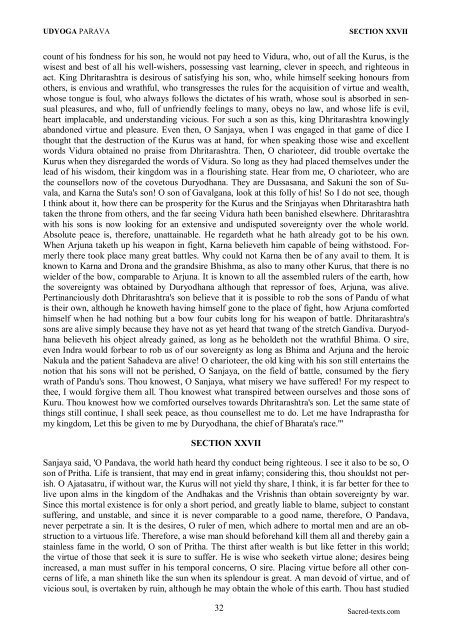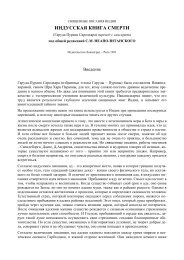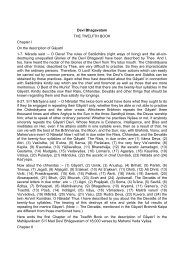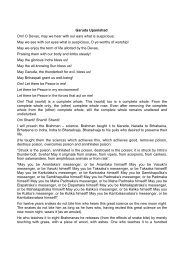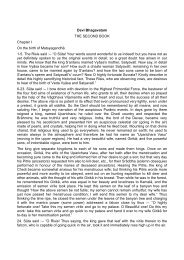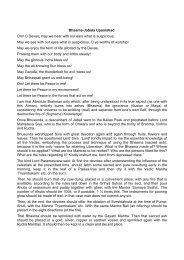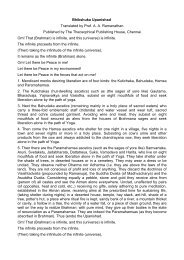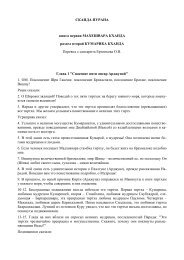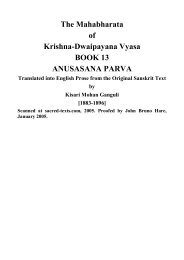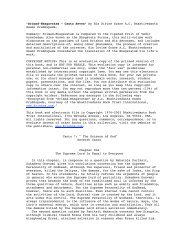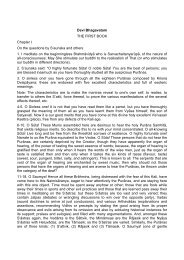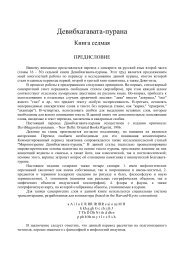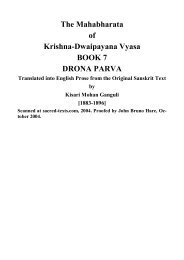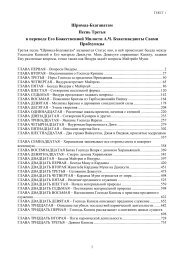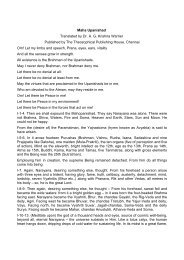Mahabharata 05 (eng)..
Mahabharata 05 (eng)..
Mahabharata 05 (eng)..
Create successful ePaper yourself
Turn your PDF publications into a flip-book with our unique Google optimized e-Paper software.
UDYOGA PARAVA<br />
SECTION XXVII<br />
count of his fondness for his son, he would not pay heed to Vidura, who, out of all the Kurus, is the<br />
wisest and best of all his well-wishers, possessing vast learning, clever in speech, and righteous in<br />
act. King Dhritarashtra is desirous of satisfying his son, who, while himself seeking honours from<br />
others, is envious and wrathful, who transgresses the rules for the acquisition of virtue and wealth,<br />
whose tongue is foul, who always follows the dictates of his wrath, whose soul is absorbed in sensual<br />
pleasures, and who, full of unfriendly feelings to many, obeys no law, and whose life is evil,<br />
heart implacable, and understanding vicious. For such a son as this, king Dhritarashtra knowingly<br />
abandoned virtue and pleasure. Even then, O Sanjaya, when I was <strong>eng</strong>aged in that game of dice I<br />
thought that the destruction of the Kurus was at hand, for when speaking those wise and excellent<br />
words Vidura obtained no praise from Dhritarashtra. Then, O charioteer, did trouble overtake the<br />
Kurus when they disregarded the words of Vidura. So long as they had placed themselves under the<br />
lead of his wisdom, their kingdom was in a flourishing state. Hear from me, O charioteer, who are<br />
the counsellors now of the covetous Duryodhana. They are Dussasana, and Sakuni the son of Suvala,<br />
and Karna the Suta's son! O son of Gavalgana, look at this folly of his! So I do not see, though<br />
I think about it, how there can be prosperity for the Kurus and the Srinjayas when Dhritarashtra hath<br />
taken the throne from others, and the far seeing Vidura hath been banished elsewhere. Dhritarashtra<br />
with his sons is now looking for an extensive and undisputed sovereignty over the whole world.<br />
Absolute peace is, therefore, unattainable. He regardeth what he hath already got to be his own.<br />
When Arjuna taketh up his weapon in fight, Karna believeth him capable of being withstood. Formerly<br />
there took place many great battles. Why could not Karna then be of any avail to them. It is<br />
known to Karna and Drona and the grandsire Bhishma, as also to many other Kurus, that there is no<br />
wielder of the bow, comparable to Arjuna. It is known to all the assembled rulers of the earth, how<br />
the sovereignty was obtained by Duryodhana although that repressor of foes, Arjuna, was alive.<br />
Pertinanciously doth Dhritarashtra's son believe that it is possible to rob the sons of Pandu of what<br />
is their own, although he knoweth having himself gone to the place of fight, how Arjuna comforted<br />
himself when he had nothing but a bow four cubits long for his weapon of battle. Dhritarashtra's<br />
sons are alive simply because they have not as yet heard that twang of the stretch Gandiva. Duryodhana<br />
believeth his object already gained, as long as he beholdeth not the wrathful Bhima. O sire,<br />
even Indra would forbear to rob us of our sovereignty as long as Bhima and Arjuna and the heroic<br />
Nakula and the patient Sahadeva are alive! O charioteer, the old king with his son still entertains the<br />
notion that his sons will not be perished, O Sanjaya, on the field of battle, consumed by the fiery<br />
wrath of Pandu's sons. Thou knowest, O Sanjaya, what misery we have suffered! For my respect to<br />
thee, I would forgive them all. Thou knowest what transpired between ourselves and those sons of<br />
Kuru. Thou knowest how we comforted ourselves towards Dhritarashtra's son. Let the same state of<br />
things still continue, I shall seek peace, as thou counsellest me to do. Let me have Indraprastha for<br />
my kingdom, Let this be given to me by Duryodhana, the chief of Bharata's race.'"<br />
SECTION XXVII<br />
Sanjaya said, 'O Pandava, the world hath heard thy conduct being righteous. I see it also to be so, O<br />
son of Pritha. Life is transient, that may end in great infamy; considering this, thou shouldst not perish.<br />
O Ajatasatru, if without war, the Kurus will not yield thy share, I think, it is far better for thee to<br />
live upon alms in the kingdom of the Andhakas and the Vrishnis than obtain sovereignty by war.<br />
Since this mortal existence is for only a short period, and greatly liable to blame, subject to constant<br />
suffering, and unstable, and since it is never comparable to a good name, therefore, O Pandava,<br />
never perpetrate a sin. It is the desires, O ruler of men, which adhere to mortal men and are an obstruction<br />
to a virtuous life. Therefore, a wise man should beforehand kill them all and thereby gain a<br />
stainless fame in the world, O son of Pritha. The thirst after wealth is but like fetter in this world;<br />
the virtue of those that seek it is sure to suffer. He is wise who seeketh virtue alone; desires being<br />
increased, a man must suffer in his temporal concerns, O sire. Placing virtue before all other concerns<br />
of life, a man shineth like the sun when its splendour is great. A man devoid of virtue, and of<br />
vicious soul, is overtaken by ruin, although he may obtain the whole of this earth. Thou hast studied<br />
32 Sacred-texts.com


